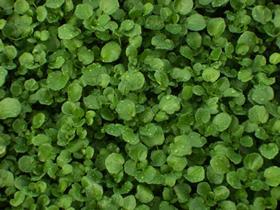
Watercress growers should prepare for a sales boost as the plant continues to be linked to health benefits and enjoys a sustained increase in demand.
The largest study to date into the benefits of watercress consumption monitors 200 women undergoing radiotherapy for breast cancer in an eight-week dietary trial.
There will be 100 in a control group, with the other 100 asked to eat a 100g bag of fresh watercress every day over eight weeks of radiotherapy treatment. Blood samples will be taken and analysed after eight weeks, three months, one year and three years.
Vitacress production and technical director Steve Rothwell said the study has huge opportunity ahead of it. “This study follows two other very comprehensive studies into the health benefits of watercress and there is absolute certainty that we will get headline material from it.”
Rothwell said that a study based at Ulster University in 2012 into the effect of watercress on white blood cells used a much smaller sample of 60 people and led to a 40 per cent uplift in watercress sales. “More people are buying food for health reasons. We have every reason to believe that watercress sales will continue to increase. It should grow ahead of the [wider] fresh produce sector as it has more to offer nutritionally.”
He said watercress is seeing a sustained and significant increase in demand as a result of a progressive consumer exercises involving good science and media campaigns. “If people eat a bag of lettuce a day as part of their 5 A Day, they are probably wasting their time. If they eat a bag of watercress, they are eating the world’s only known super-food. Not all 5 A Day portions are equal,” he said.
Managing director of The Watercress Company Tom Amery said there has been a huge interest in watercress this year and growers need to get themselves organised. “With constant annual growth we need to be looking five or six years in advance and plan to create more beds to cope with demand,” he said.
Amery said similar studies on watercress have benefited growth substantially over the last 10 years. 'The use of clinical data is essential and provides a scientific platform to build on the often inadequate understanding of the health benefits of watercress in the general public. The on-going watercress PR campaign is an essential tool for maintaining awareness throughout the year but every good campaign needs solid foundations. The net effects of the press releases coupled with the correct time of launch can prove to increase sales by up to 70%, this of course need to be planned meticulously.'
The study, which is being funded by the Watercress Alliance producer group and Vitacress Portugal, is being carried out by the Universities of Lisbon and Reading.
Ian Rowland, professor of human nutrition at the University of Reading, said: “As far as we are aware this is the first study in patients looking at the impact of a healthy dietary component such as watercress on outcomes and side effects of radiotherapy for cancer.”
The study began on 1 October at the start of Breast Cancer Awareness Month and first results are due in late summer 2014, though it will not be published until 2015.



